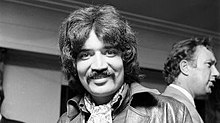
Back Peter Sarstedt Afrikaans بيتر سارسيد Arabic بيتر سارسيد ARZ Peter Sarstedt Czech Peter Sarstedt Welsh Peter Sarstedt Danish Peter Sarstedt German Peter Sarstedt Finnish Peter Sarstedt French Peter Sarstedt ID
Peter Sarstedt | |
|---|---|
 Sarstedt in 1969 | |
| Background information | |
| Birth name | Peter Eardley Sarstedt |
| Also known as | Peter Lincoln (briefly recorded as in 1967[1]) |
| Born | 10 December 1941 New Delhi, British India |
| Origin | Croydon, London, England |
| Died | 8 January 2017 (aged 75) Sussex, England |
| Genres | |
| Occupation(s) | Singer-songwriter, musician |
| Instruments |
|
| Years active | 1967–2010 |
| Labels | United Artists Island Records Angel Air Singer Records Warner |
Peter Eardley Sarstedt[2] (10 December 1941 – 8 January 2017) was a British singer-songwriter and instrumentalist. He was the brother of singers Eden Kane, a teenage pop idol and Clive Sarstedt, with both of whom he also recorded and performed as The Sarstedt Brothers.
Although his music was classified as pop, it generally encompassed ballads derived from traditional folk music rather than traditional rock and roll. He is best known for writing and performing the song "Where Do You Go To (My Lovely)?", which topped the UK Singles Chart in 1969. Set to a "faux European waltz tune"[2] and described as "a romantic novel in song",[3] it won an Ivor Novello Award. The record remained Sarstedt's biggest hit. He had one more hit single and one hit album but despite numerous releases never had chart success again.
He released the album England's Lane in 1997, which continued the story of the fictional Marie-Claire, titled Last of the Breed, a planned third installment titled Farewell Marie-Claire did not materialise.[4]
Sarstedt continued to tour mainly in 1960s revival-type shows, until his retirement in 2010 due to ill health.[5]
- ^ Cite error: The named reference
irishrockwas invoked but never defined (see the help page). - ^ a b Cite error: The named reference
allmusicwas invoked but never defined (see the help page). - ^ Cite error: The named reference
scotsmanwas invoked but never defined (see the help page). - ^ Cite error: The named reference
DCwas invoked but never defined (see the help page). - ^ Cite error: The named reference
bbcwas invoked but never defined (see the help page).